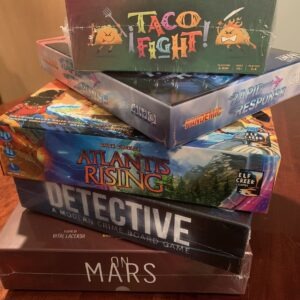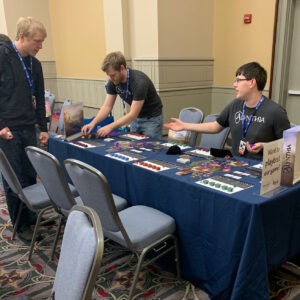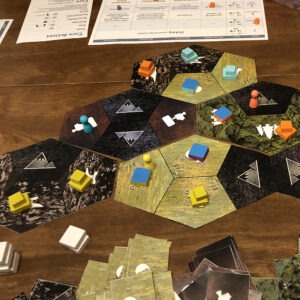Designing board games is no simple task. It’s easy to feel like a failure when an exciting idea falls flat (over and over again).
Developing board games is a process, and you need to be regularly pushing yourself to grow as a board game designer. Our experience with Alynthia has taught us three things you can start doing right now that will help you be a better tabletop game developer.

We, uh, may have a game-buying addiction.
Play more games
The first way to make better games is to play new games. And more importantly, play new types of games. It can be easy to get in a rut of only playing games you’re familiar with, but that means you’ll be out of touch.
The world of board game design is constantly evolving. Not only will playing new games allow you to be exposed to new mechanics and themes, but it will also allow you to switch places with your playtesters and experience a game from a different viewpoint.
Visualizing a game from a player’s perspective is an invaluable skill that allows you to learn which little details make a board game experience amazing, and, on the flip side, what makes a game really frustrating to play.

Connect with a community
Nothing great has been built in isolation. To become a better board game developer you need to be actively connecting with other creators and board game lovers who can provide unique perspectives and answers to difficult questions. This also allows you to benefit from other’s mistakes, learn what not to do, and get advice for future endeavors.
Whether you are meeting with a group of friends who love board games, connecting with the thriving board game communities on Facebook or Reddit, or reading blogs from other board game developers: community is critical.

Paper is your best friend when play testing a new idea.
Playtest, playtest, and playtest some more (and then start playtesting)
While playing existing games and reading about board game development is essential to growing as a designer, none of that matters if you don’t try it yourself. The best way to become a better board game developer is to try again and again. Like any skill, designing board games takes practice. By getting your designs out of your head and onto the table, you can uncover your incorrect assumptions and change your approach for the next iteration.
The Goal is Growth
In life, true success is not defined by outcomes but by growth. Board game design is no different. Through playing new board games, being inspired by a community of gamers and other developers, and playtesting often, you can ensure you will be a better board game developer tomorrow than you are today.
